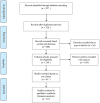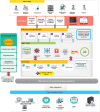Suggesting a framework for preparedness against the pandemic outbreak based on medical informatics solutions: a thematic analysis
- PMID: 33502766
- PMCID: PMC8014158
- DOI: 10.1002/hpm.3106
Suggesting a framework for preparedness against the pandemic outbreak based on medical informatics solutions: a thematic analysis
Abstract
Background: When an outbreak emerged, each country needs a coherent and preventive plan to deal with epidemics. In the era of technology, adopting informatics-based solutions is essential. The main objective of this study is to propose a conceptual framework to provide a rapid and responsive surveillance system against pandemics.
Methods: A three-step approach was employed in this research to develop a conceptual framework. These three steps comprise (1) literature review, (2) extracting and coding concepts, and determining main themes based on thematic analysis using ATLAS.ti® software, and (3) mapping concepts. Later, all of the results synthesized under expert consultation to design a conceptual framework based on the main themes and identified strategies related to medical informatics.
Results: In the literature review phase, 65 articles were identified as eligible studies for analysis. Through line by line coding in thematic analysis, more than 46 themes were extracted as potential foremost themes. Based on the key themes and strategies were employed by studies, the proposed framework designed in three main components. The most appropriate strategies that can be used in each section were identified based on the demands of each part and the available solutions. These solutions were employed in the final framework.
Conclusion: The presented model in this study can be the first step for a better understanding of the potential of medical informatics solutions in promoting epidemic disease management. It can be applied as a reference model for designing intelligent surveillance systems to prepare for probable future pandemics.
Keywords: civil defence; electronic surveillance system; framework; medical informatics; pandemics.
© 2021 John Wiley & Sons Ltd.
Conflict of interest statement
The study involves only a review of literature without involving humans and/or animals. The authors have no ethical conflicts to disclose.
The author(s) declared no potential conflicts of interest concerning the research, authorship, and/or publication of this article.
Figures







Similar articles
-
A conceptual framework for Emergency department design in a pandemic.Scand J Trauma Resusc Emerg Med. 2020 Dec 17;28(1):118. doi: 10.1186/s13049-020-00809-7. Scand J Trauma Resusc Emerg Med. 2020. PMID: 33334364 Free PMC article. Review.
-
Leveraging Informatics and Technology to Support Public Health Response: Framework and Illustrations using COVID-19.Online J Public Health Inform. 2021 Mar 21;13(1):e1. doi: 10.5210/ojphi.v13i1.11072. eCollection 2021. Online J Public Health Inform. 2021. PMID: 33936521 Free PMC article.
-
Role of Participatory Health Informatics in Detecting and Managing Pandemics: Literature Review.Yearb Med Inform. 2021 Aug;30(1):200-209. doi: 10.1055/s-0041-1726486. Epub 2021 Apr 21. Yearb Med Inform. 2021. PMID: 33882600 Free PMC article. Review.
-
Transforming user needs into functional requirements for an antibiotic clinical decision support system: explicating content analysis for system design.Appl Clin Inform. 2013 Dec 25;4(4):618-35. doi: 10.4338/ACI-2013-08-RA-0058. eCollection 2013. Appl Clin Inform. 2013. PMID: 24454586 Free PMC article.
-
Medical informatics and climate change: a framework for modeling green healthcare solutions.J Am Med Inform Assoc. 2022 Nov 14;29(12):2083-2088. doi: 10.1093/jamia/ocac182. J Am Med Inform Assoc. 2022. PMID: 36219786 Free PMC article.
Cited by
-
Rapid implementation of telepharmacy service to improve patient-centric care and multidisciplinary collaboration across hospitals in a COVID era: A cross-sectional qualitative study.Health Sci Rep. 2022 Oct 3;5(6):e851. doi: 10.1002/hsr2.851. eCollection 2022 Nov. Health Sci Rep. 2022. PMID: 36210873 Free PMC article.
-
Attitudes, Awareness, and Willingness of Iranians Toward Using Telemedicine in Post-COVID Era: A Cross-Sectional Study.Health Sci Rep. 2025 Jan 7;8(1):e70321. doi: 10.1002/hsr2.70321. eCollection 2025 Jan. Health Sci Rep. 2025. PMID: 39777285 Free PMC article.
-
A New Model of Multiple Intelligence for Teaching English Informatics in the IoT Scenario.Comput Intell Neurosci. 2022 Jun 21;2022:5642284. doi: 10.1155/2022/5642284. eCollection 2022. Comput Intell Neurosci. 2022. PMID: 35774434 Free PMC article.
-
Conceptual framework for establishing twins prevention and continuous health promotion programme: a qualitative study.BMJ Open. 2024 Apr 10;14(4):e080443. doi: 10.1136/bmjopen-2023-080443. BMJ Open. 2024. PMID: 38604635 Free PMC article.
-
Using data mining techniques to fight and control epidemics: A scoping review.Health Technol (Berl). 2021;11(4):759-771. doi: 10.1007/s12553-021-00553-7. Epub 2021 May 7. Health Technol (Berl). 2021. PMID: 33977022 Free PMC article.
References
-
- Fineberg HV. Pandemic preparedness and response—lessons from the H1N1 influenza of 2009. N. Engl J Med. 2014;370(14):1335‐1342. - PubMed
MeSH terms
LinkOut - more resources
Full Text Sources
Other Literature Sources

